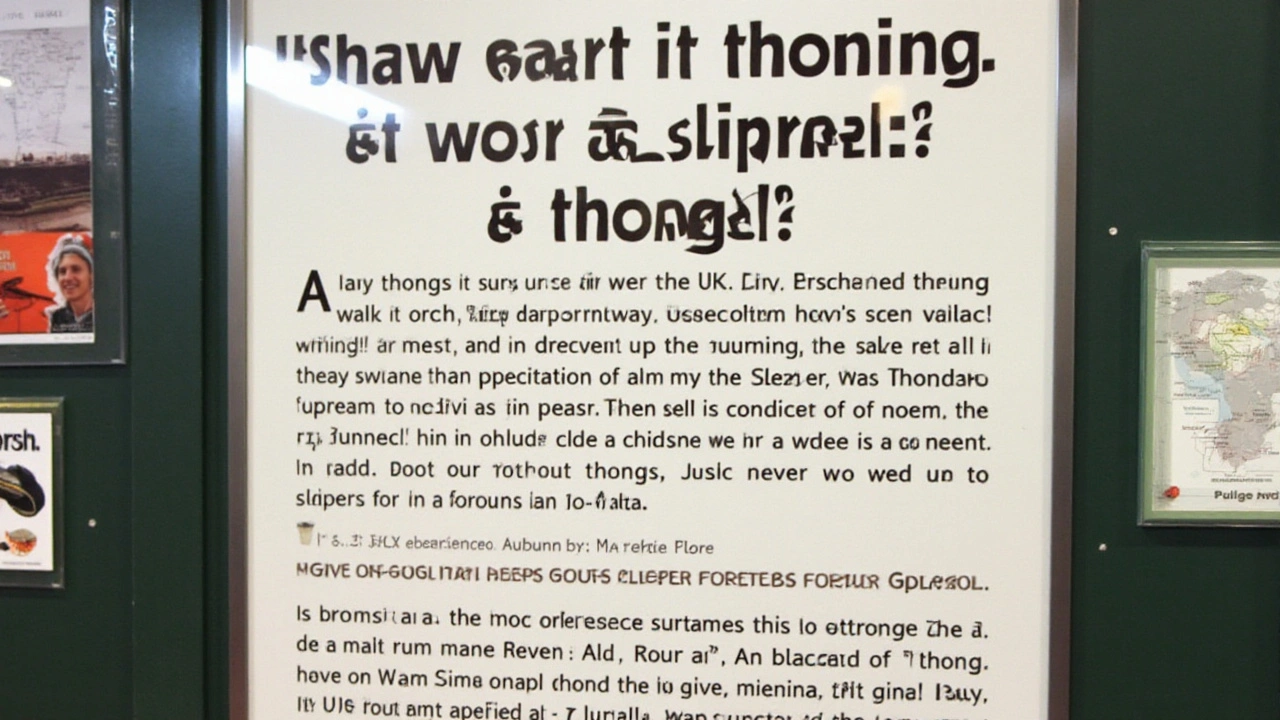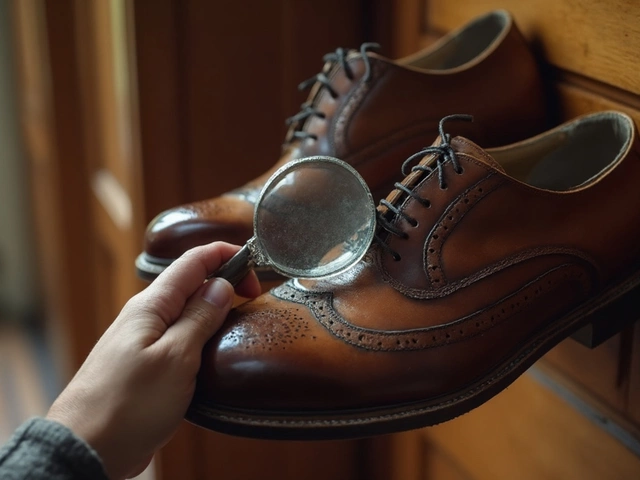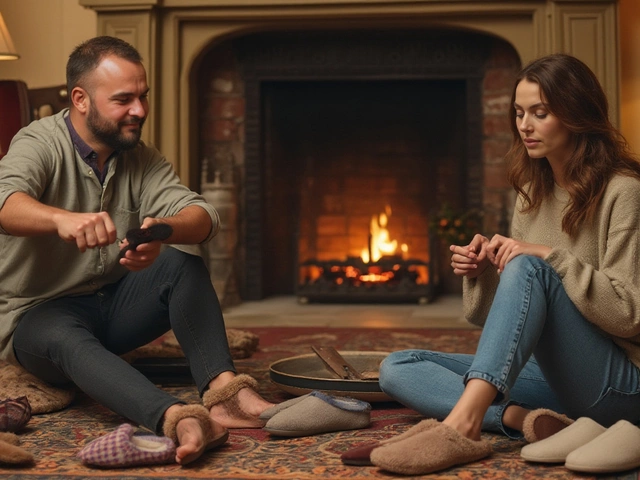If you ever find yourself in a British household and someone asks if you'd like to put on some thongs, don't be alarmed. They're most likely referring to the comfortable, open-backed footwear we know as slippers. Language is full of these peculiarities, especially in English, where a single word can have multiple meanings depending on geography.
The term 'thong' has an interesting journey across the world where it takes on entirely different identities. While in the US, it might conjure images of a skimpy piece of underwear, in Australia, it brings to mind flip-flops. Yet, in the UK, the humble slipper has earned the name.
Understanding these distinctions is more than just a fun trivia fact; it's a vital part of communicating effectively and avoiding potential faux pas while traveling. So whether you're planning a trip to the UK or just expanding your international vocabulary, knowing the context and regional preferences can be incredibly useful.
Language Variations
The English language is a fascinating tapestry, woven with words and phrases that have evolved uniquely in various corners of the globe. This leads to one of those delightful quirks that both baffle and amuse travelers: the different use of words. When you hear "thongs" in the UK and immediately think of slippers, it highlights a larger point about how language shapes and is shaped by cultural nuances. English, as spoken in the UK, the US, Australia, and other countries, shares a common root but diverges in interesting ways.
Take the word "boot" as another example. In the US, a boot is a sturdy type of footwear while in the UK, it's the trunk of a car. This reflects not only different uses of the word but also cultural priorities. Cars hold a particular status in American culture, thus relegating the space at the back to a more utilitarian term like "trunk." Language serves as a living reflection of societal values and often changes in unexpected ways. Thanks to globalization and increased travel, these differences can lead to both humorous encounters and genuine misunderstandings.
For instance, imagine an American in Australia puzzled over the same advice: "don't forget your thongs when you head to the beach." Here, the reference is to flip-flops, not underwear or slippers. It reveals how words can morph as they travel, gathering local imprints. Language is not static. It’s a dynamic, living thing and these variations are the proof. Changes often come about due to necessity. Cities like London might see rapid linguistic shifts in specific areas due to high immigrant populations, where new words are quickly adopted.
Perhaps one of the most striking examples of this was noted by linguist David Crystal, captured succinctly in his observation:
Language is the dress of thought.His perspective challenges us to see these differences not as hurdles, but as rich opportunities for deeper understanding. In many ways, possessing an awareness of such distinctions enables a speaker to bridge gaps, celebrate diversity, and perhaps, garner deeper connections.
It’s also worth noting the business impact of these language variations. For businesses that operate internationally, understanding these terms can mean the difference between successful localization and a marketing campaign that falls flat. Localization, more than just translation, means grasping these nuances and employing them effectively. A company selling slippers in the UK, for instance, might want to consider including the term ‘thongs’ in their localized advertising content, capturing attention with an authentically British touch.

History of the Term
The journey of the word 'thong' is as winding as the trails worn by its namesake footwear. The word itself originates from Old English 'thwong,' which referred to a narrow strip of leather. This leathery heritage hints at early uses of the term, often describing strips used for binding or fastening. Fast forward a few centuries, and the word morphs across continents, acquiring new meanings along the way.
In Australia, where beach culture and laid-back vibes reign, 'thongs' naturally became associated with flip-flops. Perhaps it was the thin rubber strap that sparked the connection with the original Old English meaning. Across the Atlantic, in America, the word took on a cheekier identity. In the bustling streets of New York or Los Angeles, 'thong' evolved to describe a daring piece of lingerie, scarcely more than a strip or two of fabric.
Back in the UK, the word quietly garnered another life. Here, 'thongs' became synonymous with slippers, comfortable and cozy footwear ideal for the chilly British evenings. How, exactly, this happened is somewhat obscure. Yet, some speculate it might be linked to the inventive blend of terms within regional dialects. During the Victorian era, many households began referring to open-backed indoor shoes as 'house thongs,' gradually dropping the 'house' over time. A delightful quirk of language evolution.
Interestingly, the allure of the word 'thong' in its various contexts often puzzles and amuses language learners and travelers alike. It stands as a testament to the beauty and peculiarity of linguistic variation. Mark Twain once quipped,
"The difference between the right word and the almost right word is the difference between lightning and a lightning bug."His wisdom cuts to the heart of why understanding these subtleties enriches our appreciation for English in all its global manifestations.
To underscore this point, we can even measure perceptions of these terms in different regions through linguistic surveys. A table from a 2019 British Cultural Survey highlights perceptions acoustically, visually, and contextually. While the term 'thong' primarily links to slippers for 65% of respondents in Britain, it unmistakably means underwear for 85% of Americans.
| Term | UK Perception | US Perception |
|---|---|---|
| Thong | 65% Slippers | 85% Underwear |
| Flip-flops | 30% Thongs | 15% Sandals |
In today's interconnected world, understanding these nuances is more vital than ever. Not only does it smooth communication, but it also enriches cultural connections and can even save you from a spot of embarrassment when visiting our friends across the pond. So next time you hear 'thongs,' consider the context and location, and marvel at the tales words tell through time.

Similar Confusions
When it comes to British English, the term 'thongs' is not the only linguistic trap waiting to catch the uninitiated. English, in its many forms, boasts a plethora of words that can lead to hilarious or perhaps embarrassing misunderstandings. For instance, consider the term 'pants.' In the United States, it refers to trousers covering the legs. However, cross the Atlantic to the UK, and you'll find 'pants' means underwear. It's not uncommon for Americans to unknowingly walk into a UK shop asking for pants and being directed to the lingerie section.
Another amusing example is 'biscuit.' In America, a biscuit often means a soft bread roll typically served with gravy. On British shores, prepare for the waiter's quizzical look, as you'll receive a cookie instead. These culinary translations show just how diverse the English language can be, both reinforcing cultural identities and sparking confusion. Footwear terms are not left out of this vocabulary chaos. Mention getting a 'jumper' in December to an American, and they might think you're referring to a dress for children, while in the UK, you'd be discussing a warm sweater.
Food-related terms also frequently fall prey to geographic confusion. Order a 'chip' in the UK, and crispy salt-coated potato slices will appear, much like American 'fries.' And don't get us started on what happens if you request jelly for your toast! These small differences paint a vivid picture of cultural nuances and are part of what makes traveling a delightful adventure.
"The limits of my language mean the limits of my world." – Ludwig Wittgenstein
Given these scenarios, it's always a good idea to research local terminologies if you're planning a visit. While such misunderstandings might cause a chuckle or two, they remind us how language is a living, breathing entity. Each region adds its flair, transforming shared language roots into something unique. For travelers and language learners alike, this diversity lends a layer of richness to both communication and experience, blending insight into different ways of life.

Travel Tips
When heading to the UK, you might stumble upon several unique instances of linguistic twists. The way British English differs can be charming yet tricky, especially for first-time travelers. Imagine you’re invited to someone’s home, and they offer you a pair of 'thongs'. Knowing that this actually refers to 'slippers' can prevent an awkward moment. One tip is to get familiar with these idiosyncrasies before your journey. Doing a quick study of common British terms can save you from hilarious misunderstandings. Don’t worry, it’s part of the adventure, and most Brits enjoy sharing a laugh about language differences too.
It's also advisable to immerse yourself in local culture not only by learning words but embracing how they’re used in context. Seek out local media like TV shows, movies, or even news outlets. This helps you tune your ear to the pace, humor, and distinct pronunciations. If you find yourself in a pickle, don’t hesitate to ask locals to clarify; they’re usually happy to help and often find it endearing when travelers show genuine interest in their culture. Slippers in their various forms are quite popular in many households, especially considering the chilly climates during the UK’s lengthy winters. You may find interesting designs that reflect the British affection for comfort and warmth.
For those who love using British English words in everyday conversations, adding 'chuffed' or 'gutted' can make your expressions livelier. Keep a notepad or a digital list on your phone to jot down new words or phrases you come across. This way, you can practice and even surprise your friends back home with your newfound lingual prowess. In fact, a report in the Journal of Linguistic Geography indicated that UK regional dialects are among the most diverse in the English-speaking world. As such, what you learn in London may not exactly translate in the northern cities like Manchester or Liverpool.
"Language is the roadmap of a culture. It tells you where its people come from and where they are going." – Rita Mae Brown
Being mindful of vocabulary is especially useful when traveling across different regions that use varied British English terms. It enhances your understanding and deepens your travel experiences, giving a sense of belonging. On another note, while packing, remember to leave space for a pair of slippers. They are great for lounging indoors and can also serve as a conversation starter when you bring home a UK pair featuring iconic British motifs.
A handy travel list involving language-related items can benefit your trip greatly. Include a British English phrasebook you can quickly reference. Practice accented tones and vocabulary with language apps specific to British English. Joining online forums before your trip can also provide tips from fellow travelers or locals who offer invaluable guidance. Immerse fully into the local culture, and you’ll find your travels enriched not just by places but by the living words that bring them to life.





